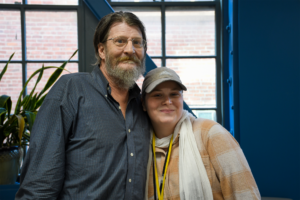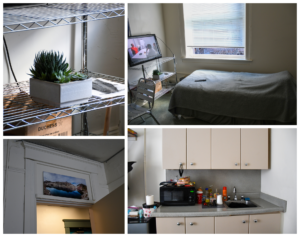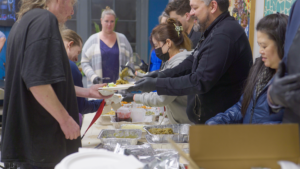Located in Seattle’s Belltown neighborhood, Plymouth’s Scargo and Lewiston Apartments are home to 99 residents, all of whom are single adults who previously experienced homelessness. Thanks to robust on-site supportive services, a vibrant sense of a community, and engagement from our local community, Scargo-Lewiston is a permanent home where residents have the resources they need to rebuild their lives.
Helping Our Residents Thrive
Living in Plymouth’s permanent supportive housing means Scargo-Lewiston residents can access a range of supportive services right where they live. Housing case managers who are Plymouth staff work one-on-one with residents, getting to know their unique needs and helping connect them to services like health care or counseling. Plymouth residents face challenges ranging from physical disability to substance use recovery, and the individualized care they receive on-site plays an important role in helping residents achieve stability following the traumatic experience of homelessness.
For Scargo-Lewiston resident Howard, working together with his housing case manager over the long run has been key: “We’re all a work in progress. Some of us work a little faster than others—some of us a little slower,” Howard said. “I mean, you can’t just snap your fingers and expect a miracle to happen. It doesn’t work that way.” At Plymouth, we emphasize meeting our residents where their at and helping them take small but might steps toward their goals.

Scargo-Lewiston resident Howard pictured with his housing case manager.
In addition to housing case management, Scargo-Lewiston residents can receive care from a visiting Neighborcare Health nurse, assistance from our 24/7 front-desk staff, and quality meals provided by our partner FareStart. Staff also maintain a pantry stocked with essential supplies. All of these wraparound services make Scargo-Lewiston a deeply supportive space where residents can leave homelessness behind permanently.
A Place To Call Home
A sense of community and belonging at Scargo-Lewiston also supports residents on their journey out of homelessness. Coffee and smiling staff faces greet residents each morning. Game nights, art projects, holiday celebrations, and group outings fill the community events calendar. Scargo-Lewiston even has a community specialist on staff devoted to coordinating activities that help residents thrive: cooking skills classes twice per month, community meetings featuring homemade meals, regular check-in groups, trips to food banks, and more.

A tour inside Troy M’s apartment at Scargo-Lewiston. Troy receives personalized care and services at Scargo-Lewiston that has helped him leave homelessness behind for good.
Part of the Surrounding Community
Individuals and businesses in Seattle contribute to the sense of community at Scargo-Lewiston, too. Recent highlights include team members from Silver Creek hosting a meal for residents and Unico staff members putting on a lively game night.
We are also grateful to volunteers from the Marriott Courtyard Seattle Downtown/Lake Union, who serve a dinner at Scargo-Lewiston once per month.
“As part of Marriott’s company culture of giving back and serving our community, this monthly meal service provides an opportunity for our associates to volunteer and become engaged in a positive way by providing a warm nutritious meal to someone who may not have access to one on their own,” General Manager Mike Schabbing shared. “Each time we go to the Scargo-Lewiston Apartments, the residents are always very thankful and appreciative of what is provided—and also grateful for the human connection and interaction with our Marriott associates. Personally, I walk away from each meal service feeling guilty, because I feel I received more kindness in return from the residents than what I have actually provided to them with a warm meal.”

Volunteers serve a community meal at Scargo-Lewiston.
Community involvement goes a long way in making Scargo-Lewiston a vibrant and supportive place to live for our residents. A big thank you to all individuals and groups who contribute to the life of Plymouth’s buildings.
Setting our residents up for success is at the heart of Plymouth’s mission, and the services and activities at Scargo-Lewiston show our philosophy in action. Plymouth aims to support our residents’ well-being at all level—physically, mentally, emotionally. The result? 95% of Plymouth residents leave life on the streets behind forever.